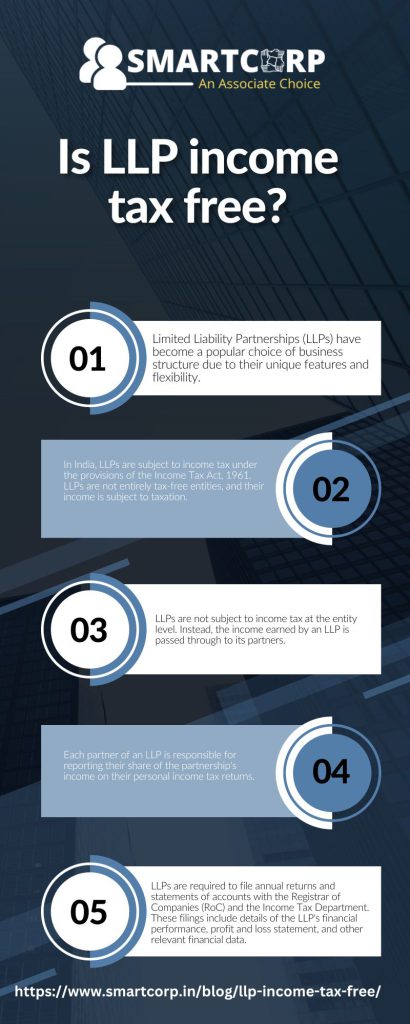
Is LLP income tax free?
Limited Liability Partnerships (LLPs) have become a popular choice of business structure due to their unique features and flexibility. While LLPs offer several advantages, including limited liability for partners and a simplified management structure, they are not entirely income tax-free entities.
In this blog, we will explore the taxation of LLPs and explain why they are not tax-free, providing insights into the tax treatment, compliance requirements, and potential benefits associated with this business structure.
Introduction to Limited Liability Partnerships (LLPs)
An LLP with LLP registration in Bangalore is a legal entity that combines the limited liability protection of a corporation with the operational flexibility and tax benefits of a partnership. LLPs are often chosen by professionals, such as lawyers, accountants, and consultants, as well as small and medium-sized enterprises (SMEs) for their business operations.
Taxation of LLPs in India
In India, LLPs are subject to income tax under the provisions of the Income Tax Act, 1961. LLPs are not entirely tax-free entities, and their income is subject to taxation. The tax treatment of an LLP is distinct from other business structures, like sole proprietorships, partnerships, and companies, and it has specific rules and compliance requirements.
Taxation Structure of LLPs
The taxation structure of LLPs can be understood by focusing on key aspects:
Taxation of LLP Income:
LLPs are not subject to income tax at the entity level. Instead, the income earned by an LLP is passed through to its partners. This means that an LLP is a tax-transparent entity, and its income is attributed to its partners, who are individually responsible for reporting and paying taxes on their respective shares of the income.
Tax on Partner’s Share of Income:
Each partner of an LLP is responsible for reporting their share of the partnership’s income on their personal income tax returns. The tax liability of partners is determined based on their applicable income tax slabs, and they are required to pay taxes accordingly.
Capital Contribution vs. Profit Share:
It is important to note that an LLP partner’s income tax liability is based on their share of profits, not their capital contribution. This allows for more flexibility in structuring an LLP, as partners can have different capital contributions but share profits equally or in any other agreed-upon proportion.
Deductions and Exemptions:
Partners of LLP with LLP registration in Bangalore can claim deductions and exemptions applicable to their share of the income, subject to the provisions of the Income Tax Act. Common deductions include business expenses, depreciation, and exemptions for specific types of income, such as long-term capital gains.
Compliance Requirements for LLPs
While LLPs do not pay income tax at the entity level, they are still subject to various compliance requirements to ensure transparency and accountability. Some key compliance requirements for LLPs include:
Annual Filing:
LLPs are required to file annual returns and statements of accounts with the Registrar of Companies (RoC) and the Income Tax Department. These filings include details of the LLP’s financial performance, profit and loss statement, and other relevant financial data.
Income Tax Return (ITR):
Each partner of an LLP is required to file an individual income tax return (ITR) reflecting their share of the LLP’s income. The due date for ITR filing is determined by the Income Tax Act and may vary based on the type and turnover of the LLP.
Tax Audit:
LLPs that have LLP registration in Bangalore with a specified level of turnover and profit may be required to undergo a tax audit as per the provisions of the Income Tax Act. A tax audit is an examination of the LLP’s financial records and accounts by a chartered accountant to ensure compliance with tax laws.
GST Compliance:
If the LLP is engaged in the supply of goods or services and has a certain level of turnover, it may also be required to comply with Goods and Services Tax (GST) regulations, including GST registration, filing returns, and payment of GST dues.

Benefits of LLP Taxation
While LLPs are not entirely income tax-free, their tax treatment offers several benefits that make them an attractive business structure:
Limited Liability:
LLP partners enjoy limited liability, which means their personal assets are protected from the business’s debts and liabilities. This protection provides a level of security for partners, as their personal wealth is not at risk due to the business’s financial obligations.
Tax Efficiency:
The pass-through taxation structure of LLPs allows for tax efficiency. Each partner is taxed individually based on their share of the income, which can lead to potential tax savings, especially when partners are in lower tax brackets.
Flexibility:
LLPs with LLP registration in Bangalore offer flexibility in structuring the distribution of profits among partners. This flexibility can help optimize the tax liability of individual partners and accommodate their financial needs and priorities.
No Dividend Distribution Tax (DDT):
Unlike companies, LLPs are not subject to Dividend Distribution Tax (DDT), which is a tax levied on companies when they distribute dividends to shareholders. This can result in cost savings for LLPs.
Simple Compliance:
The compliance requirements for LLPs are relatively simple compared to companies. There is no requirement for a board of directors, extensive financial reporting, or other corporate governance obligations.
Better Control:
Partners in an LLP have more control over the management and operations of the business, allowing for easier decision-making and adaptability to changing circumstances.
Limitations and Considerations
While LLP taxation offers numerous advantages, there are some limitations and considerations:
Limited Liability vs. Personal Assets:
While LLPs with LLP registration in Bangalore provide limited liability, partners should understand that their personal assets are not entirely shielded in the event of malpractice or negligence. Limited liability does not extend to wrongful acts or misconduct.
Taxation of Salaries:
LLP partners cannot draw salaries, and the share of profits is taxed differently from salaries. Partners need to be aware of this distinction when structuring their income.
Non-Resident Partners:
Taxation rules for non-resident partners can be complex, and withholding tax obligations may apply to their income share. It is essential for LLPs with non-resident partners to navigate these rules carefully.
Compliance Burden:
While LLP compliance requirements are simpler than those for companies, they still involve the maintenance of records, annual filings, and tax obligations. Partners should be prepared to meet these responsibilities.
Conclusion
Limited Liability Partnerships (LLPs) with LLP registration in Bangalore are not income tax-free entities. Instead, they follow a pass-through taxation structure in which the income is attributed to the individual partners who are responsible for paying taxes on their share of the income.
This taxation approach offers flexibility and potential tax advantages to partners, making LLPs a popular choice for professionals and small to medium-sized businesses.
While LLPs are subject to specific compliance requirements, the benefits of limited liability, tax efficiency, and flexibility in profit distribution make them an appealing business structure for many.
However, it’s essential for individuals and businesses considering LLPs to fully understand the taxation rules, compliance obligations, and other legal and financial aspects to make informed decisions and maximize the benefits of this business structure.
About Us
We Smartcorp are serving over lakhs of customers across India. Click the link to know more about LLP registration in Bangalore.

